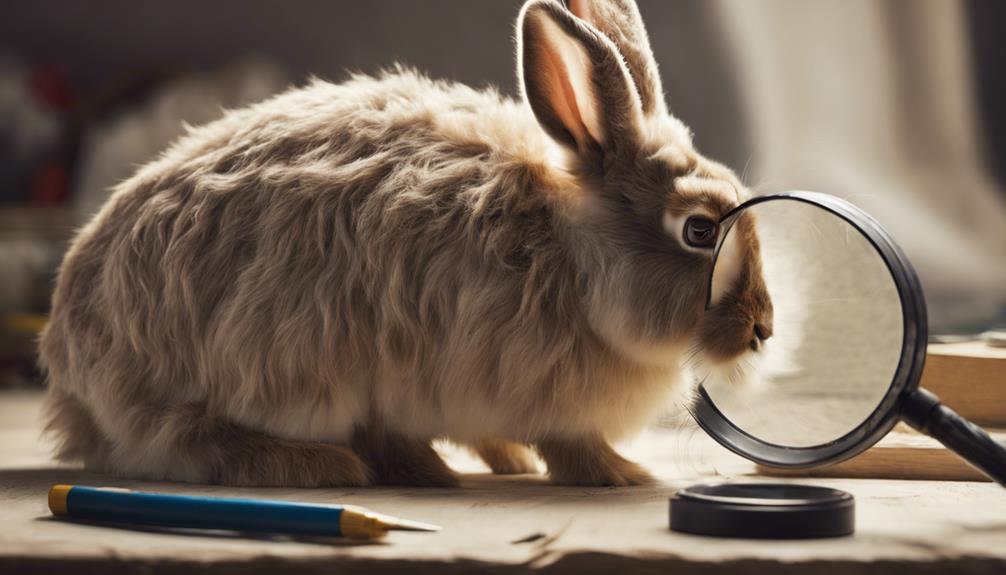Five Effective Tips to Treat Rabbit Parasites
If you've noticed your rabbit scratching excessively or experiencing weight loss, it might be due to parasites. Understanding how to effectively treat rabbit parasites is crucial for your pet's well-being.
By implementing five key tips, you can ensure your rabbit remains healthy and parasite-free. From proper hygiene practices to regular veterinary check-ups, these strategies are essential for maintaining your rabbit's overall health.
Stay tuned to uncover these valuable tips that will help you safeguard your furry friend's health and happiness.
Identifying Rabbit Parasites
To identify rabbit parasites, closely examine your rabbit's fur and skin for any signs of infestation. Parasite prevention is essential for your rabbit's health, so being vigilant is key. Check for symptoms such as excessive scratching, hair loss, redness, or small bumps on the skin. These could indicate the presence of parasites like fleas, mites, or ticks.
Regular grooming and inspection of your rabbit can help in early symptom detection. Use a fine-toothed comb to check for fleas or flea dirt, which looks like tiny black specks. Mites may cause crusty ears or skin lesions, while ticks can be visible to the naked eye, especially around the ears and neck. If you notice any of these signs, it's crucial to take action promptly to prevent the infestation from worsening.
In addition to physical symptoms, changes in behavior can also signal a parasite problem. If your rabbit seems more lethargic than usual, has a decreased appetite, or displays irritability, parasites could be the culprit. By staying observant and addressing any unusual behavior or physical changes promptly, you can protect your rabbit from the discomfort and health risks associated with parasitic infestations.
Proper Hygiene Practices
Maintaining proper hygiene practices is essential for preventing and managing rabbit parasites effectively. By implementing good hygiene practices in your rabbit's environment, you can significantly reduce the risk of parasite infestations. Start by regularly cleaning your rabbit's living area, including cages, litter boxes, and surrounding spaces. Remove any soiled bedding, droppings, and uneaten food promptly to prevent the buildup of bacteria and parasites. Additionally, ensure that your rabbit has access to clean and fresh water daily to promote overall health and immunity against parasites.
When handling your rabbit, wash your hands thoroughly before and after interacting with them. This simple practice can prevent the transmission of parasites between you and your pet. Regular grooming sessions are also important for parasite prevention. Brush your rabbit's fur to remove any dirt, debris, or potential parasites that may be hiding in their coat. Keeping your rabbit clean and well-groomed goes a long way in maintaining their overall health and minimizing the risk of parasite infestations.
Furthermore, regularly inspect your rabbit for any signs of parasites such as fleas, ticks, or mites. If you notice any unusual behavior, changes in appetite, or skin irritations, consult your veterinarian immediately for proper diagnosis and treatment. By incorporating these hygiene practices into your routine, you can create a safe and healthy environment for your rabbit, reducing the likelihood of parasite-related issues.
Effective Parasite Treatments
Implementing regular parasite treatments is crucial for maintaining your rabbit's health and preventing infestations. When it comes to effective parasite treatments, there are a few key options to consider.
Firstly, natural remedies can be beneficial for preventing parasites in rabbits. Some natural remedies like apple cider vinegar or diatomaceous earth can help deter parasites from infesting your rabbit's fur and skin. These remedies are safe and can be used as a preventive measure against parasites.
However, in cases where parasites have already infested your rabbit, parasite medications are essential for proper control. Parasite medications prescribed by your veterinarian are designed to target specific parasites such as fleas, mites, or worms. It's crucial to follow the dosage instructions carefully to ensure the treatment is effective and safe for your rabbit.
In addition to using natural remedies and parasite medications, maintaining good hygiene practices and a clean living environment for your rabbit is vital for parasite prevention. Regularly cleaning your rabbit's living space, washing their bedding, and grooming them can help minimize the risk of parasites infesting your furry friend.
Regular Veterinary Check-ups
Regularly scheduling veterinary check-ups for your rabbit is essential for ensuring their overall health and well-being. These check-ups play a crucial role in the prevention and early detection of parasites, helping to keep your furry friend healthy and happy. During these visits, your veterinarian will examine your rabbit to assess their overall health status and check for any signs of parasites such as fleas, mites, or worms.
Prevention measures are key during these veterinary check-ups. Your veterinarian may recommend preventative treatments such as spot-on treatments, oral medications, or vaccinations to protect your rabbit from common parasites. These measures can help to reduce the risk of infestations and keep your rabbit parasite-free.
In case your rabbit is diagnosed with parasites during a check-up, your veterinarian will discuss treatment options with you. Depending on the type of parasite and the severity of the infestation, treatment may involve medications, topical treatments, or dietary changes. Your veterinarian will guide you on the best course of action to effectively eliminate the parasites and prevent reinfestation.
Nutritious Diet for Prevention
Ensuring your rabbit's health and well-being starts with providing a nutritious diet to prevent parasites. Preventative measures are crucial in maintaining your rabbit's overall health. A diet rich in high-quality hay, fresh vegetables, and limited pellets can help boost your rabbit's immune system, making it less susceptible to parasites. Ensure that the hay provided is fresh and free of dust or mold, as these can compromise your rabbit's respiratory health and weaken its immune system.
Incorporating dietary supplements such as probiotics can also aid in preventing parasites by promoting a healthy gut flora. Probiotics help maintain a balanced digestive system, making it harder for parasites to thrive in your rabbit's intestines. Additionally, including herbs like garlic and oregano in your rabbit's diet can act as natural deterrents against parasites due to their strong antibacterial and antiparasitic properties.
Remember to provide clean, fresh water at all times to support your rabbit's overall health and digestion. Water plays a crucial role in maintaining proper hydration levels and facilitating the elimination of toxins from your rabbit's body.
Environmental Cleanliness Tips
To maintain a parasite-free environment for your rabbit, focus on keeping its living space meticulously clean. Implementing proper sanitation practices is crucial in preventing parasites from infesting your rabbit. Regularly clean your rabbit's cage by removing any bedding that's soiled or wet. Replace the bedding with fresh, clean materials to create a hygienic living environment for your furry friend. Additionally, disinfect the cage using pet-safe cleaning products to eliminate any potential parasite eggs or larvae that may be present.
Cage maintenance plays a vital role in ensuring your rabbit's environment remains free of parasites. Check the cage regularly for any signs of damage or wear that may compromise its integrity. Repair or replace any broken parts to prevent pests from entering the cage and causing harm to your rabbit. Proper ventilation in the cage is also essential to reduce the risk of parasite infestations. Ensure that the cage has adequate airflow to keep it dry and prevent the buildup of moisture, which can attract parasites.
Monitoring Rabbit Behavior Changes

Keep a close eye on your rabbit's behavior for any changes that could indicate potential health issues. Behavior monitoring is crucial in detecting early signs of parasites in rabbits. Pay attention to how active your rabbit is, its eating habits, grooming behavior, and overall demeanor. Any sudden shifts in these patterns could be symptomatic of underlying health issues. For instance, if your rabbit becomes lethargic, loses interest in food, shows signs of distress, or displays unusual aggression, these could be red flags that warrant immediate attention.
Symptom observation is key in identifying rabbit parasites. Watch out for symptoms such as diarrhea, weight loss, dull fur, excessive scratching or grooming, and visible parasites like fleas or ticks. Rabbits infected with parasites may also exhibit changes in behavior such as increased restlessness or a reluctance to be handled. By closely monitoring these behavioral changes, you can intervene promptly and prevent the parasites from causing further harm to your rabbit.
Importance of Quarantine Period
Monitoring your rabbit's behavior for any signs of parasites also highlights the importance of implementing a thorough quarantine period. When introducing a new rabbit into your home, quarantine precautions are essential to prevent the spread of potential parasites to your existing pets. Parasite prevention starts with isolating the new rabbit in a separate area for at least 2-3 weeks. This period allows you to observe the rabbit for any signs of illness or parasites without risking the health of your other pets.
During the quarantine period, ensure that the new rabbit has no physical contact with your existing rabbits. This separation minimizes the risk of parasite transmission through direct contact. Additionally, practice good hygiene by washing your hands thoroughly after handling the quarantined rabbit to prevent the potential spread of parasites between animals.
Regularly clean and sanitize the quarantine area to maintain a hygienic environment and reduce the risk of parasites thriving in the living space. Remember to disinfect food and water bowls, litter boxes, and any other items used by the quarantined rabbit to prevent the spread of parasites to other animals in your household.
Frequently Asked Questions
Can Rabbit Parasites Be Transmitted to Other Pets or Humans?
Rabbit parasites can pose risks for other pets and humans due to potential transmission. Parasite prevention is crucial to safeguarding everyone in the household.
Be cautious as some parasites can spread through contact with infected rabbits or their contaminated environments.
Regular veterinary check-ups and maintaining good hygiene practices can help mitigate transmission risks and protect the well-being of all family members, furry or not.
Are There Any Natural Remedies for Treating Rabbit Parasites?
When dealing with rabbit parasites, you might wonder about natural remedies. Herbal remedies can sometimes help, but it's crucial to consult a vet for proper treatment.
Prevention measures, like keeping your rabbit's living area clean and avoiding contact with wild animals, can also reduce the risk of parasites. Remember to always prioritize your furry friend's health and well-being by seeking professional advice when needed.
How Often Should Rabbits Be Checked for Parasites by a Veterinarian?
Regular check-ups with a vet are essential for your rabbit's health. They can advise on how often to check for parasites based on your rabbit's lifestyle.
Prevention measures like keeping their living area clean and providing a balanced diet can also help reduce the risk of parasites.
Can Indoor Rabbits Still Get Parasites From Outdoor Sources?
Yes, indoor rabbits can still get parasites from outdoor sources. To prevent this, make sure to keep your indoor rabbit's living area clean and regularly check them for any signs of parasites.
When bringing outdoor items inside, like hay or fresh produce, inspect them carefully for any potential parasites.
What Are the Potential Long-Term Effects of Untreated Rabbit Parasites on a Rabbit's Health?
Ignoring rabbit parasite treatment tips can lead to severe long-term consequences. Without intervention, parasites can cause chronic health issues, such as anemia, weight loss, and organ damage.
To prevent these risks, ensure regular vet check-ups, maintain a clean living environment, and implement parasite prevention measures like proper hygiene and using safe treatments.
Prioritize your rabbit's health by addressing parasites promptly to avoid potential long-term health complications.
Conclusion
In conclusion, by following these five effective tips for treating rabbit parasites, you can ensure the health and well-being of your furry friend.
Remember to stay vigilant in identifying any signs of parasites, maintain proper hygiene practices, seek effective treatments from a veterinarian, provide a nutritious diet, and keep their environment clean.
By taking these proactive steps, you can help prevent and manage parasite infestations in your rabbit.
